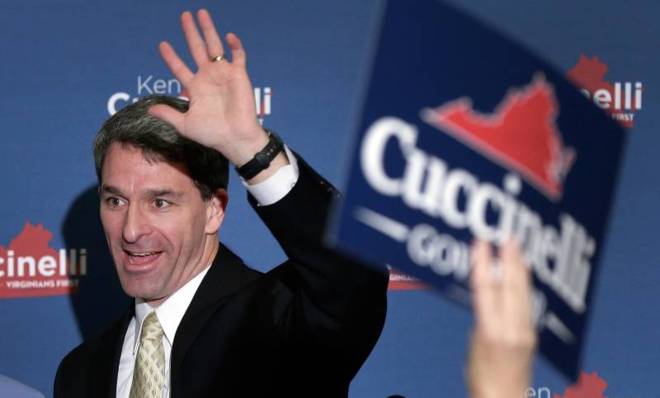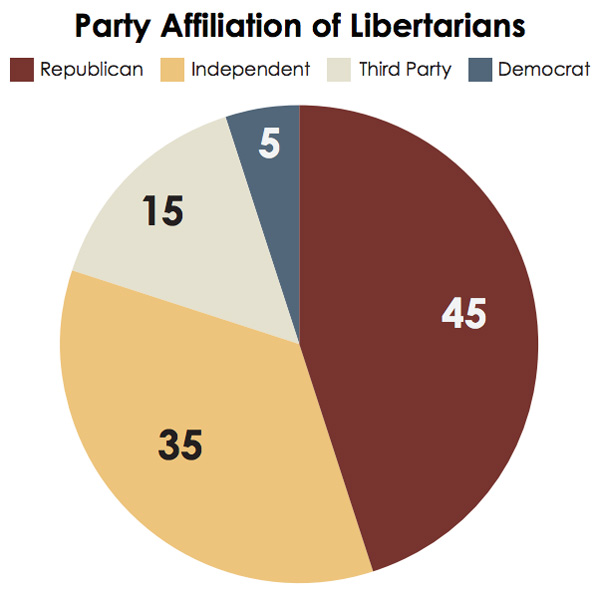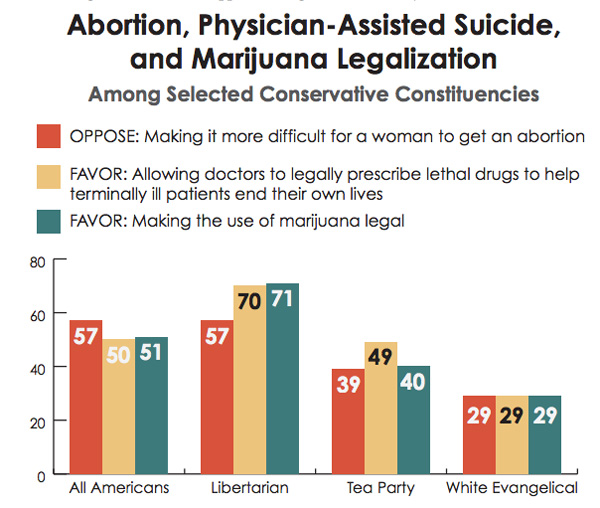The GOP's budding libertarian problem
Beware the Nader effect

A free daily email with the biggest news stories of the day – and the best features from TheWeek.com
You are now subscribed
Your newsletter sign-up was successful
Libertarians, known for their opposition to all manner of government intervention, tend to be lumped in with the Republican Party. A new report on libertarianism in America, however, finds a group that "doesn’t fit on the traditional liberal-to-conservative spectrum."
Libertarians — who account for about 10 percent of the population — are not a particularly diverse group. The survey, conducted by the Public Religion Research Institute, found that they are almost all white (94 percent) and mostly male (68 percent), with an average age of 44 — three years younger than your average Tea Partier.
But those young, white males have a variety of political allegiances, with less than half of them identifying as Republican.
The Week
Escape your echo chamber. Get the facts behind the news, plus analysis from multiple perspectives.

Sign up for The Week's Free Newsletters
From our morning news briefing to a weekly Good News Newsletter, get the best of The Week delivered directly to your inbox.
From our morning news briefing to a weekly Good News Newsletter, get the best of The Week delivered directly to your inbox.

Those independent libertarians usually swing right in elections, meaning the GOP can normally count on their support. But at least one ongoing campaign shows that the libertarian wing of the party may be chafing at the dominance of the mother ship.
Enter Robert Sarvis, a member of the Libertarian Party, who is currently pulling in 8 percent of the vote in the Virginia governor's race. Those are voters who, for the most part, would otherwise be voting for Republican candidate Ken Cuccinelli, who is currently trailing former Democratic National Committee Chairman Terry McAuliffe by 12 points.
Yes, that's right: It would appear that Republicans in Virginia are undergoing what Democrats know as the Nader effect, with Sarvis playing the spoiler role that the Green Party's Ralph Nader played in the 2000 presidential race, much to Al Gore's chagrin.
Granted, that gap in the polls can't be entirely attributed to the rise of libertarianism. Cuccinelli is considered by many to be a uniquely awful candidate. Furthermore, the GOP as a party is still struggling to repair its image following the debacle of the government shutdown.
A free daily email with the biggest news stories of the day – and the best features from TheWeek.com
Still, there are signs that this surge of support for Sarvis centers around social issues, given that Cuccinelli's economic views are solidly libertarian. He is fiercely opposed to ObamaCare, and has campaigned on a pledge to cut the state income tax by 15 percent.
Cuccinelli's social positions led Ed Crane, former president of the Cato Institute, to head a PAC that raised $300,000 for Sarvis. “Ken Cuccinelli is a socially intolerant, hard-right conservative with little respect for civil liberties," he told The Washington Examiner.
Cuccinelli is an observant Catholic who not only opposes gay marriage, but sodomy as well. Libertarians, the latest survey found, were far less conservative on that issue than other groups that skew Republican. The same was true for social issues like abortion and the legalization of marijuana.

In other words, the GOP may want to consider toning down its rhetoric on social issues for more than the oft-cited reason of appealing to moderates. A shift may be necessary to keep its already dwindling voting bloc together.
Keith Wagstaff is a staff writer at TheWeek.com covering politics and current events. He has previously written for such publications as TIME, Details, VICE, and the Village Voice.
-
 Regent Hong Kong: a tranquil haven with a prime waterfront spot
Regent Hong Kong: a tranquil haven with a prime waterfront spotThe Week Recommends The trendy hotel recently underwent an extensive two-year revamp
-
 The problem with diagnosing profound autism
The problem with diagnosing profound autismThe Explainer Experts are reconsidering the idea of autism as a spectrum, which could impact diagnoses and policy making for the condition
-
 What to know before filing your own taxes for the first time
What to know before filing your own taxes for the first timethe explainer Tackle this financial milestone with confidence
-
 The billionaires’ wealth tax: a catastrophe for California?
The billionaires’ wealth tax: a catastrophe for California?Talking Point Peter Thiel and Larry Page preparing to change state residency
-
 Bari Weiss’ ‘60 Minutes’ scandal is about more than one report
Bari Weiss’ ‘60 Minutes’ scandal is about more than one reportIN THE SPOTLIGHT By blocking an approved segment on a controversial prison holding US deportees in El Salvador, the editor-in-chief of CBS News has become the main story
-
 Has Zohran Mamdani shown the Democrats how to win again?
Has Zohran Mamdani shown the Democrats how to win again?Today’s Big Question New York City mayoral election touted as victory for left-wing populists but moderate centrist wins elsewhere present more complex path for Democratic Party
-
 Millions turn out for anti-Trump ‘No Kings’ rallies
Millions turn out for anti-Trump ‘No Kings’ ralliesSpeed Read An estimated 7 million people participated, 2 million more than at the first ‘No Kings’ protest in June
-
 Ghislaine Maxwell: angling for a Trump pardon
Ghislaine Maxwell: angling for a Trump pardonTalking Point Convicted sex trafficker's testimony could shed new light on president's links to Jeffrey Epstein
-
 The last words and final moments of 40 presidents
The last words and final moments of 40 presidentsThe Explainer Some are eloquent quotes worthy of the holders of the highest office in the nation, and others... aren't
-
 The JFK files: the truth at last?
The JFK files: the truth at last?In The Spotlight More than 64,000 previously classified documents relating the 1963 assassination of John F. Kennedy have been released by the Trump administration
-
 'Seriously, not literally': how should the world take Donald Trump?
'Seriously, not literally': how should the world take Donald Trump?Today's big question White House rhetoric and reality look likely to become increasingly blurred